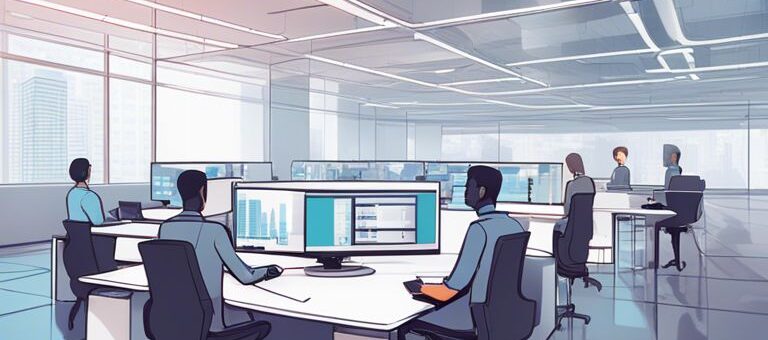Just think about how digital transformation is completely revolutionizing the way we work and live our lives. I see it every day – the integration of technology into our workplaces isn’t just a trend; it’s a game-changer. If you want to stay relevant, you’ve got to embrace this shift, adapt your skills, and understand the power it holds. In this blog post, I’m going to break down how the future of work is taking shape through digital innovation and what that means for you and your career.
Understanding Digital Transformation
To kick things off, you need to get a real grip on what digital transformation actually means. It’s not just some tech buzzword thrown around in boardrooms or at conferences. Nope, it’s a game-changer that fundamentally reshapes how businesses operate and deliver value to customers. Imagine taking your current business model and injecting it with the latest technologies and processes – that’s digital transformation. It’s about leveraging technology to improve efficiencies, enhance customer experiences, and even create entirely new ways of doing business.
What is Digital Transformation?
Digital transformation is the integration of digital technology into all areas of a business, fundamentally changing how you operate and deliver value to your customers. This isn’t just an IT project; it’s a cultural shift that requires organizations to continually challenge the status quo, experiment, and get comfortable with failure. When I talk about digital transformation, I’m referring to how companies can use the power of technology to meet the ever-evolving needs of their clients and stay ahead in a competitive market.
The Key Drivers of Change
Transformation is driven by several factors, primarily the breathtaking pace of technological advancements and changing consumer expectations. I mean, think about it: technology is moving faster than ever, and if you’re not keeping up, you’re going to be left behind. Customer expectations are rising; they demand seamless interactions and personalized experiences. This creates an environment where businesses must adapt or risk obsolescence. Striking a balance between innovation and operational efficiency is where the magic happens.
Drivers of change in digital transformation include not just the technology itself but also market pressures and societal shifts. It’s about recognizing the importance of data analytics, embracing cloud solutions, and using AI and automation to streamline operations. Moreover, the rise of remote work has made digital transformation even more crucial. You can’t afford to sit on the sidelines anymore. Jump in, engage with your customers, and leverage these tools to create a future-proof strategy that aligns with how the world is evolving.
The Impact on Work Culture
You know, the way we think about work is changing. Digital transformation is at the forefront of this evolution, and it’s making a massive impact on work culture. I believe that our mindset has to be flexible and adaptive to stay relevant in this fast-paced environment. You’ve got to be open to changes in technology, communication styles, and collaborative methods. Shifting mindsets is imperative; it’s about actively embracing new tools and practices rather than resisting them. When we captivate our team with the potential of digital advancements, them and us can bring fresh ideas to the table like never before.
Shifting Mindsets
Work culture today is not a fixed entity, and we can’t pretend it is. We’ve got to shift from a traditional rigidity to a more agile approach that allows us to flourish in uncertainty. I am talking about an environment where you and your team can experiment without fear of failure. Every misstep is a lesson learned, and that’s the beauty of this digital transformation journey. When we cultivate a culture of growth and resilience, we build something that can withstand the test of time.
This means you have to lead by example. When you embrace change, others will follow suit. It’s that simple. You’ll find that when your team is empowered and allowed to take risks, they’ll become more innovative and show a level of engagement that drives results. Shifting mindsets toward a culture of adaptability opens the door for creativity and collaboration, ensuring your workforce is not only ready for the future but actively shaping it.
Collaboration in a Digital Age
Any future-ready work culture is built on the foundation of strong collaboration. The digital tools we have today make this easier than ever. I mean, think about it—online project management platforms, instant messaging, video conferencing; these tools can bridge gaps that were once a hurdle in traditional setups. The ability to connect and collaborate in real-time empowers us to break geographical barriers and build teams that can work seamlessly from different locations. Collaboration in a digital age isn’t just a perk; it’s a necessity. It’s how we adapt, grow, and thrive together.
It’s important to harness the power of digital collaboration tools effectively, so you’re not just using them for the sake of it—being strategic in your approach can make all the difference. For instance, the way we share ideas, provide feedback, and execute projects needs to be synchronised to create a cohesive workflow. This harnesses not only productivity but also fosters a sense of community despite physical distances. When we leverage these tools wisely, we’re not just collaborating; we’re revolutionising how we work together, and that’s powerful.
Skills of the Future
Some of you might be wondering what skills are necessary for the future of work, and let me tell you, it’s all about adaptability and being able to pivot like a pro. The job market is transforming right before our eyes, and if you’re not ready to shift your gears, you’re going to get left behind. We’re entering a phase where the basic skills we once relied on are not going to cut it anymore. Instead, it’s going to be the ability to evolve and learn new skills that will separate the winners from the losers.
Emphasizing Soft Skills
Any person serious about their future should recognize the immense value of soft skills. I can’t stress this enough! Being good at communicating, collaborating, and adapting to change is crucial. You could be the best technical expert in the world, but if you can’t navigate a conversation or inspire a team, good luck advancing your career. Leaders are looking for those who can build relationships and contribute positively to the workplace culture, so hone those abilities!
In this fast-paced world, your empathy, teamwork, and creativity are your golden tickets. These are the foundational skills that, when enhanced, serve as a springboard for your professional success. I urge you to get out there and practice active listening, foster positive relationships, and embrace innovative thinking. It’s those nuances that will propel you forward, and trust me, companies need people who can think outside the box now more than ever.
The Rise of Technical Proficiency
An undeniable fact is that technical skills are on the rise, whether you’re a digital marketer or a healthcare worker. You need to hop on the latest technologies if you want to stay relevant. We’re talking about everything from data analytics to AI-powered tools. They’re not just buzzwords; they’re crucial for getting results. With every tick of the clock, technology is advancing, and if you’re not grasping these tools, you’re putting yourself at a serious disadvantage.
For instance, understanding data analytics can be a game-changer in your field. If you can make sense of the numbers and implement data-driven decision-making, you’re ahead of the curve. Plus, with the rise of automation, knowing how to work in environments where technology completes tasks will free your time to focus on higher-level work. The future requires a unique blend of tech-savvy and emotional intelligence, and if you nail these, you’ll not just survive—you’ll thrive in the years to come!
Conclusion
Considering all points, I can’t stress enough how digital transformation is absolutely revolutionizing the landscape of work as we know it. The way I see it, your job won’t just be a role anymore; it will evolve into a dynamic tapestry of skills, tools, and experiences driven by technology. You need to embrace this shift, adapt, and learn continually. If you’re just sitting back and hoping things won’t change, you’re going to be left in the dust. The future of work is all about flexibility, agility, and using digital tools to empower yourself like never before. It’s exciting, bold, and it’s happening right now!
Your ability to thrive in this new business ecosystem hinges on being proactive and leveraging technology as an enabler, not an obstacle. I mean, think about it: remote work, automation, AI, and data analytics are not just trends; they’re the new normal. You can either ride this wave or get wiped out trying to resist it. The choice is yours! So let’s roll with the digital punches, level up our skills, and get ready for what this exhilarating future of work has to offer, because I promise you, it’s going to be a wild ride!


